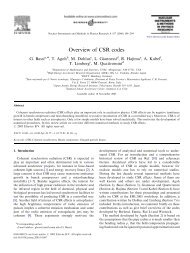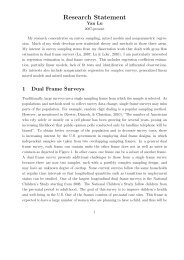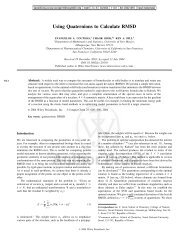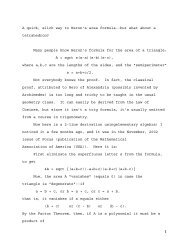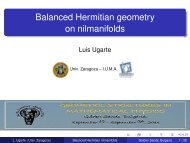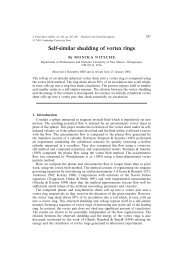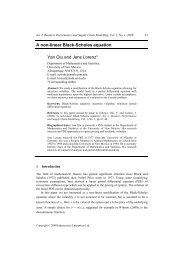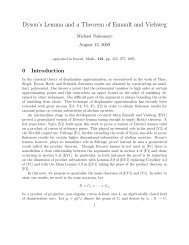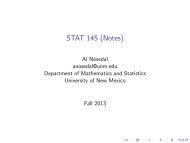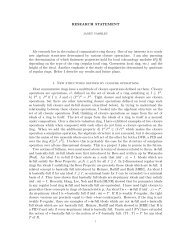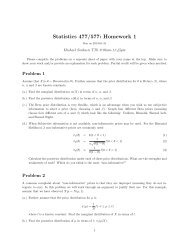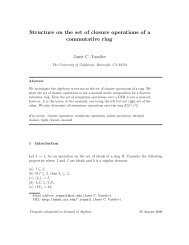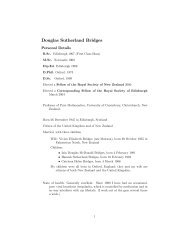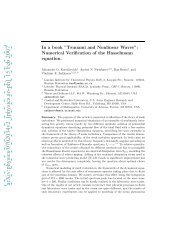OEO Office of Equal Opportunity - Department of Mathematics and ...
OEO Office of Equal Opportunity - Department of Mathematics and ...
OEO Office of Equal Opportunity - Department of Mathematics and ...
Create successful ePaper yourself
Turn your PDF publications into a flip-book with our unique Google optimized e-Paper software.
170 ARTS AND SCIENCES<br />
521. Seminar: Interpersonal Communication. (3)<br />
Theories <strong>and</strong> research on the components <strong>and</strong> dynamics<br />
<strong>of</strong> interpersonal interaction <strong>and</strong> comparative analysis <strong>of</strong><br />
approaches to the study <strong>of</strong> interpersonal communication.<br />
522. Topics in Interpersonal Communication. [Studies in<br />
Interpersonal Communication.] (3 to a maximum <strong>of</strong> 6) ∆<br />
Intensive study <strong>of</strong> theory <strong>and</strong> research in one area <strong>of</strong> interpersonal<br />
communication chosen by the instructor. Content<br />
varies from semester to semester, may be repeated with<br />
different content.<br />
531. Contemporary Rhetoric. (3)<br />
Approaches <strong>of</strong> different rhetorical theorists to the analysis <strong>of</strong><br />
rhetorical discourse.<br />
532. Studies in Rhetoric. (3 to a maximum <strong>of</strong> 6) ∆<br />
Intensive study <strong>of</strong> theory <strong>and</strong> research in one area <strong>of</strong> rhetorical<br />
communication chosen by the instructor. Content varies from<br />
semester to semester, may be repeated with different content.<br />
538. Seminar: Rhetorical Criticism. (3)<br />
Survey <strong>of</strong> methods for analyzing symbols rhetorically as an<br />
approach to answering research questions in communication.<br />
542. Topics in Organizational Communication. [Current<br />
Developments in Organizational Communication.] (3 to a<br />
maximum <strong>of</strong> 6) ∆<br />
Intensive study <strong>of</strong> one area <strong>of</strong> theory <strong>and</strong> research in organizational<br />
communication chosen by the instructor, e.g., conflict<br />
<strong>and</strong> negotiation, information technology, organizational<br />
cultures. Content varies from semester to semester, may be<br />
repeated with different content.<br />
544. Seminar: Organizational Communication. (3)<br />
Intensive survey <strong>of</strong> classical <strong>and</strong> contemporary organizational<br />
communication theory emphasizing current research trends.<br />
Advanced readings in such topics as organizational innovation,<br />
intercultural organizations, critical theory applications<br />
to organizations, computer mediated communication <strong>and</strong><br />
employee participation.<br />
550. Health Communication. (3)<br />
Concepts <strong>and</strong> strategies for preventive health communication<br />
in such contexts as provider-patient interaction, health campaigns,<br />
social marketing, health images in the mass media<br />
<strong>and</strong> communication in health care organizations.<br />
552. Topics in Health Communication. [Studies in Health<br />
Communication.] (3 to a maximum <strong>of</strong> 6) ∆<br />
Intensive study <strong>of</strong> theory <strong>and</strong> research in one area <strong>of</strong> health<br />
communication chosen by the instructor. Content varies<br />
from semester to semester, may be repeated with different<br />
content.<br />
554. Diffusion <strong>of</strong> Innovations. (3)<br />
The spread <strong>of</strong> new ideas, especially technological innovations,<br />
among the members <strong>of</strong> a system. Sources <strong>of</strong> innovations,<br />
importance <strong>of</strong> interpersonal networks in diffusion <strong>and</strong><br />
consequences <strong>of</strong> technological innovations.<br />
557. [527.] Seminar: Persuasion. (3)<br />
Theories <strong>and</strong> research on the processes by which behavioral<br />
<strong>and</strong> attitudinal change are produced primarily by messages.<br />
561. Seminar: Communication <strong>and</strong> Media. (3)<br />
Analysis <strong>of</strong> theories <strong>and</strong> methodological approaches used to<br />
examine media impact on society. Current media topics may<br />
be selected for class analysis.<br />
562. Topics in Mass Communication. [Current<br />
Developments in Mass Communication.] (3 to a maximum<br />
<strong>of</strong> 6) ∆<br />
Intensive study <strong>of</strong> one area <strong>of</strong> theory <strong>and</strong> research in mass<br />
communication chosen by the instructor, e.g., rating systems,<br />
programming, economics, regulation, social effects. Content<br />
varies from semester to semester, may be repeated with<br />
different content.<br />
565. Multiculturalism, Gender <strong>and</strong> Media. (3)<br />
Exploration <strong>of</strong> how gender, race, class, sexual orientation,<br />
ethnicity <strong>and</strong> other social positions affect media coverage,<br />
portrayals, production <strong>and</strong> reception. The course focuses on<br />
theories, methods <strong>of</strong> analysis <strong>and</strong> topics <strong>of</strong> current interest.<br />
583. Teaching the Basic Course. (1)<br />
Current issues associated with teaching introductory courses<br />
focusing on the role <strong>of</strong> graduate teaching assistants.<br />
593. Graduate Problems. (1-3 to a maximum <strong>of</strong> 6) ∆<br />
Independent study on questions <strong>and</strong> issues beyond those<br />
covered by regularly approved seminars. Plan must be prepared<br />
<strong>and</strong> approved by a faculty member who agrees to direct<br />
the study. Approval by department chairperson required.<br />
598. Master’s Project. (1-6)<br />
Plan II students only. Having registered for the project plan,<br />
the student must continue to register for a minimum <strong>of</strong> 1 hour<br />
<strong>of</strong> 598 during each regular semester (exclusive <strong>of</strong> summer)<br />
until the project is completed <strong>and</strong> approved.<br />
Restriction: permission <strong>of</strong> advisor. Offered on CR/NC basis<br />
only.<br />
599. Master’s Thesis. (1-6) [1-6]<br />
Plan I students only. Having registered for the thesis plan, the<br />
student must continue to register for a minimum <strong>of</strong> 1 hour <strong>of</strong><br />
599 during each regular semester (exclusive <strong>of</strong> summer) until<br />
the thesis is approved. Offered on CR/NC basis only.<br />
600. History <strong>and</strong> Philosophy <strong>of</strong> Communication. (3)<br />
Advanced study <strong>of</strong> the modern history <strong>and</strong> philosophical<br />
foundations <strong>of</strong> the study <strong>of</strong> human communication with attention<br />
to contributions <strong>of</strong> both humanistic <strong>and</strong> social science<br />
traditions <strong>and</strong> consideration <strong>of</strong> contemporary controversies<br />
concerning theory <strong>and</strong> research.<br />
601. Theories <strong>of</strong> Communication. (3)<br />
Advanced study <strong>of</strong> concepts, models <strong>and</strong> perspectives in the<br />
development <strong>of</strong> theories <strong>of</strong> communication with attention to<br />
the reciprocal relationship between theory building <strong>and</strong> theory<br />
testing in the study <strong>of</strong> human communication processes.<br />
607. Communication Research Methods: Quantitative.<br />
(3)<br />
Advanced study <strong>of</strong> methods, techniques <strong>and</strong> instruments<br />
useful in investigations that employ quantitative analysis <strong>of</strong><br />
human communication processes.<br />
608. Communication Research Methods: Qualitative.<br />
(3)<br />
Advanced study <strong>of</strong> methods, techniques <strong>and</strong> procedures useful<br />
in investigations that employ qualitative analysis <strong>of</strong> human<br />
communication processes.<br />
614. Advanced Intercultural Communication. (3)<br />
The relationship between culture <strong>and</strong> communication with<br />
implications for intercultural encounters, historical roots <strong>of</strong><br />
intercultural communication <strong>and</strong> theories <strong>of</strong> intercultural<br />
communication.<br />
699. Dissertation. (3-12)<br />
Having registered for the dissertation, the student must continue<br />
to register for a minimum <strong>of</strong> 1 hour <strong>of</strong> 699 during each<br />
regular semester (exclusive <strong>of</strong> summer) until the dissertation<br />
is completed <strong>and</strong> approved.<br />
Restriction: permission <strong>of</strong> advisor. Offered on a CR/NC<br />
basis only.<br />
CRIMINOLOGY<br />
The Sociology <strong>Department</strong> serves as the administrative unit<br />
for the criminology program. See Sociology for program<br />
requirements <strong>and</strong> course descriptions.<br />
UNM CATALOG 2006–2007 Symbols, page 611.



